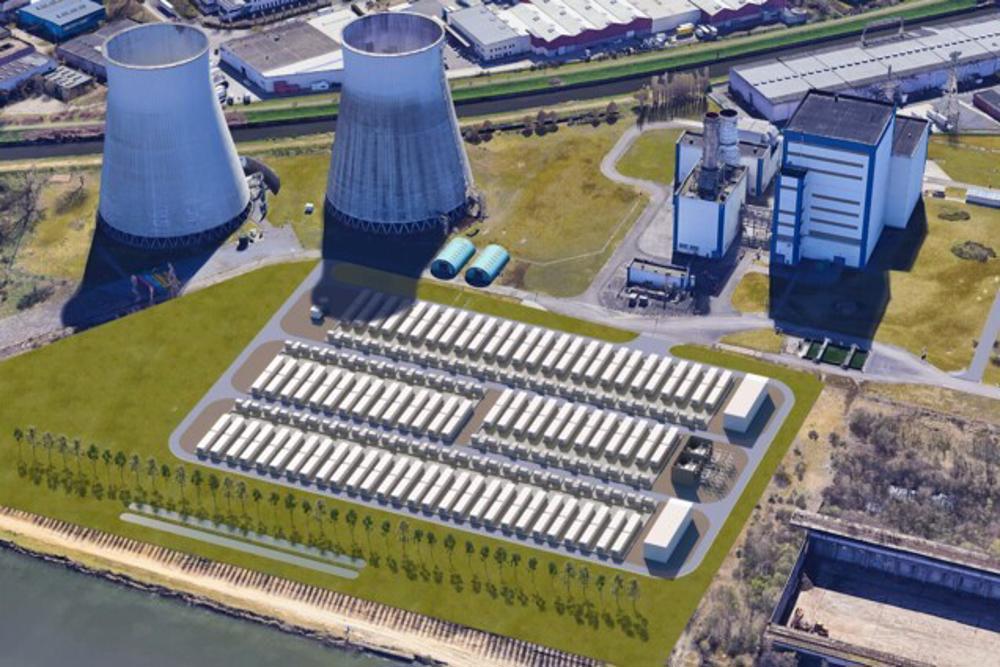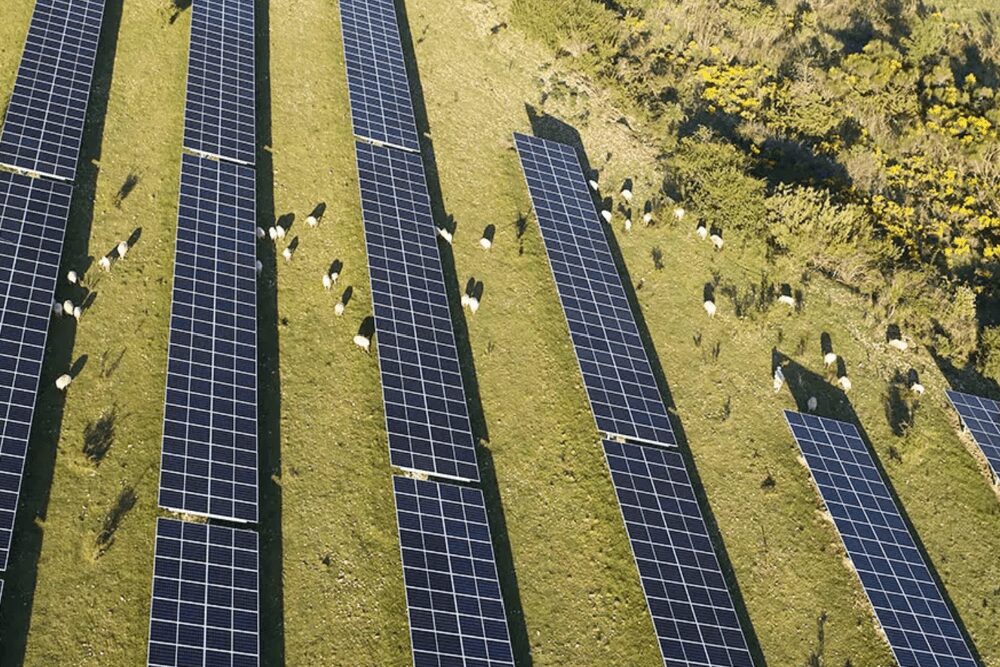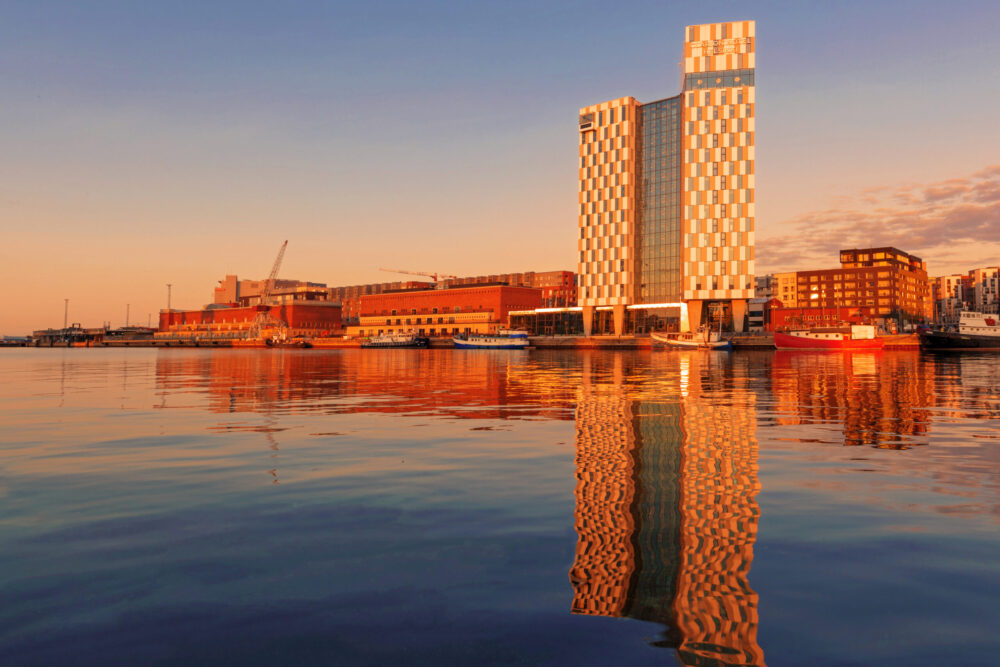
An international jury has selected four winners from the ten finalists in the Helsinki Energy Challenge. The four winning teams were announced during a virtual event introduced by the Mayor of Helsinki, Jan Vapaavuori, and will each take a share of the €1 million prize fund.
The climate crisis is the most crucial challenge of our time, and cities have a key role in driving the shift to a low-carbon economy. Helsinki is one of the leading cities in the transition towards a sustainable future, with the goal of becoming carbon-neutral by 2035.
But there is an issue to overcome – currently, more than half of the city’s heat is produced with coal.
In order to achieve carbon-neutrality, radically new solutions are needed to meet Helsinki’s heat demand. And Helsinki is not alone. To fight climate change, sustainable heating solutions are needed in cities all over the world. Heating not just beyond coal, but also beyond burning biomass.
That’s why the Helsinki Energy Challenge was launched. It is a global one-million-euro challenge competition to answer the question: How can we decarbonise the heating of Helsinki, using as little biomass as possible?
The Helsinki Energy Challenge was a year-long process. The competition was kicked off on 27 February 2020 and it inspired 252 teams from 35 countries from around the world to participate. Ten finalist teams were selected in November 2020 and invited to join the co-creation phase of the competition.
During the co-creation phase, which included a three-day intensive virtual boot camp, the teams received support and additional information to be able to develop their solutions further.
The finalist teams submitted their final proposals in January 2021 and in February, an international panel of experts – including Hans Jørgen Koch, Nordic Energy Research; Markku Ollikainen, University of Helsinki & Chair of the Finnish Climate Change Panel; Robert Stoner, MIT Energy Initiative and MIT Tata Center for Technology and Design; Sanna Syri, Aalto University; Brian Vad Mathiesen, University of Aalborg and Martin YoungWorld Energy Council – evaluated the proposals and made their decisions.
The four winning proposals are:

The HIVE logo. Image courtesy of the Helsinki Energy Challenge.
HIVE, a flexible plan, based on proven technologies and solutions, such as seawater heat pumps, electrical boilers, solar thermal fields and demand side management measures; the plan is capable of integrating new technologies if and when these emerge.
Project team:
Storengy (France): Philippe Aubry
Newheat (France): Julien Metge
Engie (France & Belgium): Romain Donat – Sandrine Bosso – Valentin Gavan – Jean Baptiste Débonnaire – Albin Popot
PlanEnergi (Denmark): Daniel Trier
AEE Intec (Austria): Ingo Leusbrock
Savosolar (Finland): Laurène Mejean
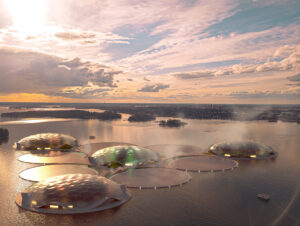
Artist’s impression of the Hot Heart, courtesy of the Helsinki Energy Challenge.
Helsinki’s Hot Heart, a system made of 10 floating reservoirs filled with 10 million cubic metres of hot seawater that can receive different energy sources as input. Four of the cylindrical tanks that make up Helsinki’s Hot Heart would be enclosed with inflatable roof structures to create a new leisure attraction.
Project team:
Carlo Ratti Associati (Italy): Carlo Ratti – James Schrader – Alberto Benetti – Chenyu Xu – Stephanie Lee, Rui Guan
Ramboll (Finland): Jouni Laukkanen – Mika Kovanen – Kreetta Manninen
Transsolar (Germany): Thomas Auer – Monika Schulz – Alice Chevrier – Helmut Meyer
Danfoss / Leanheat (Finland): Jukka Aho – Juho Nermes – Lauri Leppa – Oddgeir Gudmundsson
Schneider Electric (Finland): Jan Mattsson – Jani Vahvanen
OP (Finland): Kaisa Ahtiainen
Schlaich Bergermann Partner (Germany): Mike Schlaich – Boris Reyher
Squint/Opera (UK): Alice Britton – Manu Sainz – Tom Law – Kelly Woodward – Svenja Schlossarek
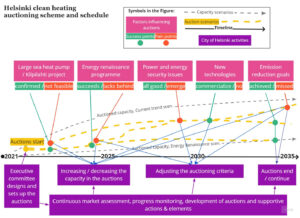
Beyond Fossils. Image courtesy of the Helsinki Energy Challenge.
Beyond Fossils, an energy transition model based on open and technology-neutral clean heating auctions, paving the path to carbon-neutral Helsinki in a flexible and innovation enabling way.
Project team:
VTT Technical Research Centre of Finland: Åsa Hedman, Tomi J. Lindroos
Finnish Environment Institute (SYKE): Hannu Savolainen, Karoliina Auvinen
Hansel: Pasi Tainio
Aleksi Lumijärvi (independent expert)
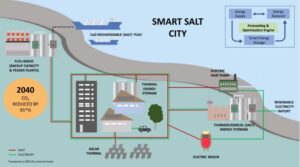
Smart salt city. Image courtesy of the Helsinki Energy Challenge.
Smart Salt City, a solution that melds a novel thermochemical energy storage and artificial intelligence with commercially available energy technologies.
Project team:
SaltX Technology (Sweden): Corey Blackman, Eric Jacobson, Magnus Ekblad, Lars Croon, Michele Pressiani, Pankaj Gujarathi, Carl-Johan Linér, Nadia Amirpour, Boo Ljungdahl
Rebase Energy (Sweden): Ilias Dimoulkas, Sebastian Haglund, Mihai Chiru
Mayor of Helsinki, Jan Vapaavuori, said cities must take the energy revolution into their own hands if we are to meet the accelerating challenge presented by climate change.
“While many cities have the raw ingredients for energy transition, the scale of the challenge requires leaders within city governments to create a policy environment that rejects the status quo and actively stimulates innovation and synthesis,” Mr Vapaavuori said.
“The Helsinki Energy Challenge is one output of a City-wide mission to reduce our carbon footprint. Throughout my mayoralty we have operated under the policy that every action is a climate action. I’m proud that in Helsinki we are leading a search for new solutions that have global potential.”
Project Director of the Helsinki Energy Challenge, City of Helsinki, Laura Uuttu-Deschryvere, said: “Through the Helsinki Energy Challenge, we have been led to new ways of thinking and approaches which would not necessarily have arisen without this competition.”
“During the one-year-long process, it became clear that there was a need for our exceptional approach. Energy revolution and climate change mitigation require non-traditional means of finding solutions,” she said.
“As a result of our work with some of the leading innovators in urban heating from across the globe, we now have a very wide range of solutions in our hands, which we can utilise in our decisions in the future. The clearest winner of the Challenge is Helsinki itself. We have learned tremendously during the process and we will be sharing these lessons with all cities.”
More information on the finalists and the winners of the Helsinki Energy Challenge can be found here.










